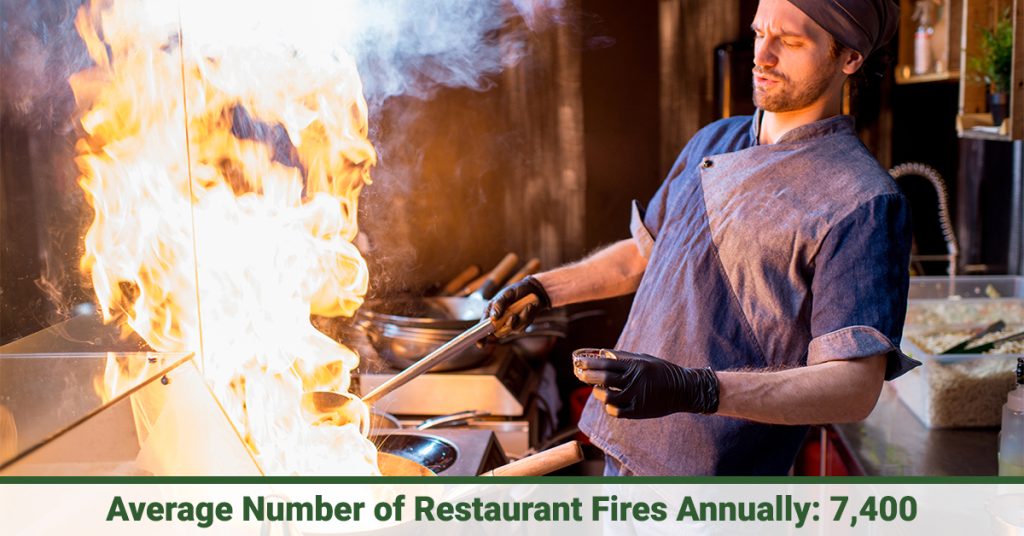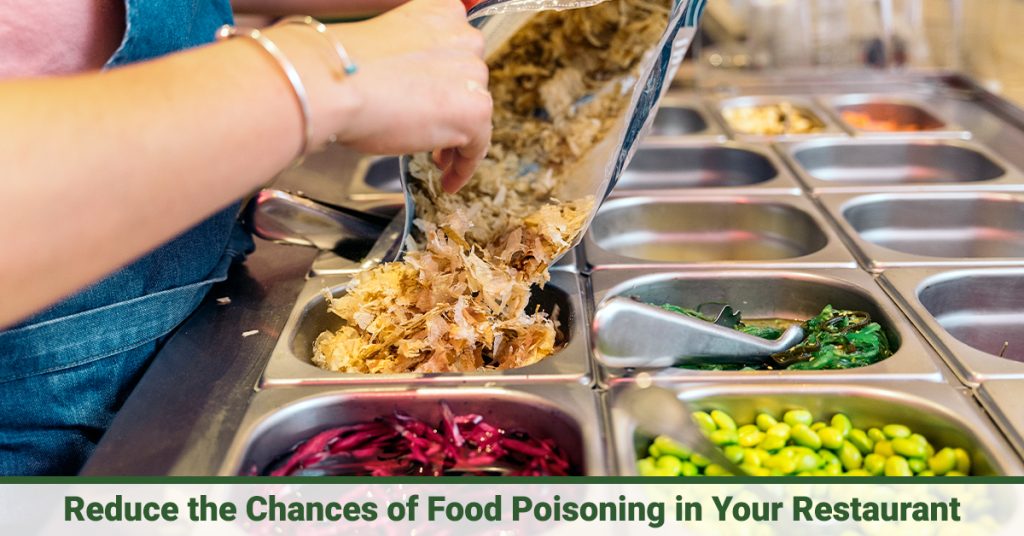Restaurants are busy places with unique risk profiles. Bustling kitchens, sharp implements, open flames, and hot surfaces—not to mention all of the customers and staff moving around—can create hazards.
The potential for lawsuits or property damage resulting from the day-to-day operations of your business is high. These six tips can help you avoid having to file a restaurant insurance claim and keep your operation running smoothly.
Topics Covered
Tip #1 – Avoid Equipment Failure & Kitchen Fires
Food spoilage from a freezer or refrigerator malfunction is a restaurant disaster you want to avoid at all costs. Can you imagine having to throw away all that food?
These preventative maintenance tips for kitchen appliances can help you avoid having to file an insurance claim:
- Check refrigerator and freezer gaskets and seals for leaks or weaknesses.
- Check water levels on equipment such as ice machines.
- Promptly replace faulty equipment.
- Ensure proper ventilation to reduce heat and maximize airflow.
- Clean all equipment regularly.

Sixty-one percent of fires in restaurants involve cooking equipment annually, according to the U.S. Fire Administration’s (USFA’s) National Fire Incident Reporting System (NFIRS). In addition, there are over 7,400 recorded restaurant fires per year.
The risk is real and worth taking seriously. To reduce the risk of a fire in your restaurant, you can take the following precautions:
- Properly store flammable materials like oils, grease, and fats.
- Keep flammable materials away from open flames.
- Clean out equipment prone to grease build-up (grease traps, fryers, oven hoods, etc.)
- Promptly repair faulty wiring.
- Install fire suppression and fire alarm systems.
- Keep hand-held fire extinguishers in strategic locations.
Tip #2 – Take Food Conditions Seriously

Food poisoning from eating in restaurants can and does happen. Salmonella and E. coli are some of the most common causes.
For example, in September 2022, ninety-seven people across six states were infected with E. coli from eating tainted food from the fast-food giant Wendy’s. Forty-three people were hospitalized, and ten people developed a serious condition that can cause kidney failure called hemolytic uremic syndrome.
To reduce the chances of food poisoning in your restaurant, you can enforce the following:
- Proper handwashing.
- Strict hygiene policies.
- Keep foods that may contaminate other foods separate, like raw meat.
- Refrigerate foods at the proper temperatures.
- Don’t let employees work when they’re sick.
- Purchase food from USDA-approved facilities.
- Cook food to order and to proper temperatures.
You’ll want to ensure that your employees know how to properly handle and prepare food to avoid similar situations at your establishment. You might consider getting food handler licenses for your staff when it makes sense to do so as well.
Tip #3 – Reduce Workplace Injuries
According to the US Bureau of Labor Statistics, some of the most common restaurant injuries are burns, cuts, sprains, and strains. There are steps you can take to mitigate these risks, such as:
- Require employees to wear cut-resistant gloves.
- Keep cutting implements sharp.
- Properly train employees on safety and what to do when an accident does occur.
- Use non-slip footwear, non-slip flooring, or rubber mats to prevent slips and falls.
- Regularly clean floors to keep them free of oil and grease.
- Store heavy items between chest and waist height to reduce sprains and strains.
- Split heavy loads into multiple trips.
- Train employees on how to operate equipment and tools safely.
- Turn off stoves when not in use to prevent burns.
- Keep hot pots and pans away from the body when handling them.
- Provide employees with safety equipment like oven mitts, aprons, and splatter shields.
- Let hot plates and food cool slightly before serving them.
- Store hot foods in heat-safe containers.
- Don’t allow food runners to carry too much at any one time to avoid spills.
- Design your restaurant to maximize space for walkways and other egresses, which can help your staff safely transport food and supplies around your working environment.
In addition, it’s a good idea to ensure that someone on your staff is trained to administer first aid for choking and CPR. CPR can be used on unresponsive choking victims because chest compressions can expel foreign objects from a victim’s airway. Learn more about choking hazards at the Mayo Clinic here.
Tip #4 – Prevent Slip and Fall Injuries
Slip and fall injuries can easily occur during a normal business day. Hazards like wet floors and uneven surfaces can injure customers and staff, resulting in liability or worker’s compensation claims.
To eliminate these hazards, ensure that spills are cleaned promptly and that the proper signage is used to alert customers and staff; signs should remain up until the floor is completely dry. Uneven surfaces should be well-marked.
Don’t forget about outdoor hazards, either. Icy or snowy walkways and poor lighting can contribute to slips and falls for staff and customers as they enter and exit your building. Remember that the safety of your parking lots is important too.
Tip #5 – Safe Driving Condition
Driving and food deliveries open your restaurant up to increased liability potential, as do intoxicated customers operating motor vehicles that leave your restaurant.
You can reduce or prevent these occurrences by taking the following actions:
- Run background checks on drivers.
- Train employees to identify road hazards.
- Reinforce safe driving practices such as wearing seat belts, not using cell phones unless parked, obeying traffic laws, and signing a safe driving policy.
- Protect your business with commercial auto insurance and non-owned auto insurance.
- Spread deliveries across multiple drivers to avoid overwhelming your employees and making them feel rushed.
- Maintain delivery records.
- Use vehicle surveillance technology like cameras and GPS to monitor and contact drivers quickly and efficiently.
- Avoid late-night deliveries when employees may be more vulnerable to crime.
- Limit alcohol consumption by patrons.
- Purchase liquor liability insurance to protect yourself if a patron drives from your establishment while intoxicated after consuming alcohol at your restaurant or bar.
Tip #6 – Filing a Claim? Don’t Make These Mistakes!
The likelihood that you’ll have to file an insurance claim for your restaurant is fairly high. However, there are some do’s and don’ts that you’ll want to follow to ensure that you get what you need out of your insurance coverage.
MISTAKE #1 – Not Understanding Your Policy
It’s important to understand what your policy does and does not cover. The last thing you want is to file a claim only to find out that you will have to pay out-of-pocket because a disaster isn’t covered. Take the time to read and understand your policy ahead of time and identify gaps in coverage.
Better yet, talk to one of our local agents to find out how we can help you get the protection you need and ensure that you’re adequately covered.
At a minimum, you’re going to want to understand the following:
- Coverage Gaps
- Deductibles
- Premiums
- Cash Value of Property
- Replacement Value
If you claim property damage and it’s valued according to cash value instead of replacement value, you may have to pay the difference out-of-pocket. The bottom line is to read and understand your policy.
MISTAKE #2 – Waiting to File a Claim
If you suffer from an event that needs to be claimed, such as a fire or a slip and fall injury, you need to report it to your insurer right away. The longer you wait, the harder the claims process will likely be.
MISTAKE #3 – Thinking Your Insurer is Your Enemy
Always be professional and courteous when working with your insurer. Lack of cooperation can result in a denied claim, especially if the insurer feels you’re acting aggressively or defensively. They know that fraud can and does happen, and you don’t want to raise any red flags.
However, if you have reason to believe that an estimate, damage, or lost property is undervalued, document your concerns and politely work with your insurer to find a resolution.
MISTAKE #3 – Not Documenting Damage
Immediately record proof of damage with times, dates, pictures, and even videos to provide your insurer with up-to-date information. You’ll also want to keep a record of all correspondence with your insurer, such as emails and phone calls, to ensure you’re both on the same page and avoid any miscommunications.
MISTAKE #4 – Throwing Away Damaged Items
This is a big no-no. Your insurer needs to see first-hand that the damage you’re claiming exists and is reasonable. Keep all damaged property as physical evidence until the claim is closed.
MISTAKE #5 – Admitting Fault
If someone is injured in your restaurant, be polite, helpful, and professional, but never admit fault. It can open your business up to frivolous lawsuits. It’s better to let any necessary investigations take place first, and admitting fault can make it harder for your insurer to defend you in case of a lawsuit. Also, some policies don’t allow you to admit fault without your insurer’s consent. Remember what we said about understanding what’s in your policy?
MISTAKE #6 – Paying Claims Out of Pocket
If someone is injured in your restaurant and you pay their medical costs, your insurance policy won’t reimburse you and may deny your claim.
Does your restaurant business insurance cover your risks?
Are there gaps you might not be aware of in your business insurance policies?
Contact us or find an agent near you today to learn how we can customize your business insurance policies to meet your needs.
*Disclaimer: We offer content for informational purposes; Co-Op Co-operative Insurance Companies may not provide all the services or products listed here. Please contact your local agent to learn more about how we can help with your insurance needs.
Sources
FSR. 4 Common Restaurant Injuries and How to Avoid Them.
Mayo Clinic. Choking: First aid.
National Fire Protection Association. Structure Fires in Eating and Drinking Establishments.
OFT. Precautions Restaurants Should Take To Prevent Food Poisoning.

